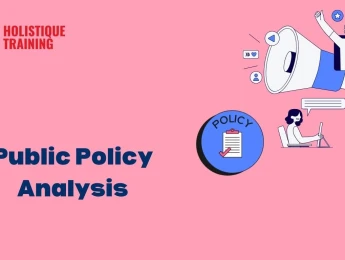The "Public Policy Analysis: Tools, Techniques, and Impactful Decision-Making" training course is designed to equip professionals with the skills and methodologies needed to evaluate, design, and influence public policies effectively. Public policy analysis is critical in shaping decisions that address societal challenges and enhance governance. This course provides a comprehensive understanding of how policies are formulated, implemented, and evaluated, enabling participants to contribute meaningfully to the policymaking process.
Participants will explore key concepts in public policy, such as problem identification, stakeholder engagement, and policy evaluation. The training applies analytical tools and frameworks to assess policy options, measure outcomes, and propose evidence-based recommendations. Participants will also learn about the political, economic, and social factors influencing public policy and the strategies for navigating these complexities.
Through case studies, simulations, and interactive discussions, participants will gain hands-on experience analysing real-world policy issues. The course emphasises critical thinking, ethical decision-making, and collaborative problem-solving to address contemporary policy challenges.
This program is ideal for policy advisors, government officials, NGO leaders, and public administration or advocacy professionals. By the end of the course, participants will have the tools to conduct robust policy analyses, influence decision-making processes, and drive impactful change.
Upon the completion of this course, participants will be able to:
- Provide a comprehensive understanding of public policy analysis and its importance.
- Develop skills for evaluating policy options using analytical tools.
- Enable participants to design and recommend evidence-based policy solutions.
- Teach strategies for engaging stakeholders and navigating political and social contexts.
- Foster ethical and critical thinking in public policy decision-making.
This course is designed for:
- Policy analysts and advisors in government and public administration.
- NGO leaders and professionals involved in advocacy and social initiatives.
- Researchers and academics focusing on public policy or social sciences.
- Professionals in international organisations working on policy design and implementation.
- Aspiring policymakers and graduate students in public administration or political science.
The course employs an interactive and experiential learning approach to ensure participants can apply theoretical knowledge to real-world contexts. It combines lectures with hands-on activities, including policy simulations, role-playing exercises, and group discussions.
Case studies of successful and challenging policy implementations will be used to highlight practical lessons and encourage critical thinking. Participants will work in teams to analyse specific policy problems and present evidence-based solutions, fostering collaboration and peer learning.
Trainers will demonstrate analytical techniques using interactive tools such as data visualisations and decision matrices. Personalised feedback on exercises and presentations will help participants refine their skills. Additional resources, including templates and toolkits, will support ongoing learning and application beyond the course.
Day 5 of each course is reserved for a Q&A session, which may occur off-site. For 10-day courses, this also applies to day 10
Section 1: Foundations of Public Policy Analysis
- Introduction to public policy and its role in governance
- The policymaking process: stages and key actors
- Defining policy problems and setting objectives
Section 2: Analytical Tools and Frameworks
- Cost-benefit analysis and its applications
- Multi-criteria decision analysis (MCDA)
- Tools for qualitative and quantitative policy evaluation
Section 3: Stakeholder Engagement and Political Context
- Identifying and analysing stakeholders
- Strategies for effective communication and collaboration
- Understanding the political, economic, and social dimensions of policy
Section 4: Policy Implementation and Evaluation
- Challenges in policy implementation and strategies to overcome them
- Monitoring and evaluating policy outcomes
- Techniques for reporting and presenting findings
Section 5: Ethical Considerations in Policy Analysis
- Addressing bias and ensuring transparency
- Balancing competing interests in policy decisions
- Ethical frameworks for decision-making in public policy
Section 6: Case Studies and Practical Applications
- Analysing real-world public policy scenarios
- Designing policy recommendations for complex issues
- Learning from successes and failures in policy implementation
Upon successful completion of this training course, delegates will be awarded a Holistique Training Certificate of Completion. For those who attend and complete the online training course, a Holistique Training e-Certificate will be provided.
Holistique Training Certificates are accredited by the British Assessment Council (BAC) and The CPD Certification Service (CPD), and are certified under ISO 9001, ISO 21001, and ISO 29993 standards.
CPD credits for this course are granted by our Certificates and will be reflected on the Holistique Training Certificate of Completion. In accordance with the standards of The CPD Certification Service, one CPD credit is awarded per hour of course attendance. A maximum of 50 CPD credits can be claimed for any single course we currently offer.
- Course Code IND17 - 111
- Course Format Classroom, Online,
- Duration 5 days













